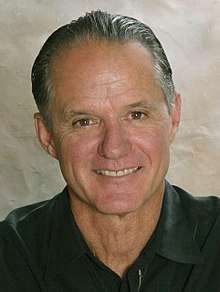Richard Strozzi-Heckler
Richard Strozzi-Heckler (born Richard Heckler in 1944) is an American author, coach, and consultant on "embodied leadership and mastery."[1]
Richard Strozzi-Heckler | |
|---|---|
 | |
| Born | 1944 (age 75–76) |
| Nationality | American |
| Alma mater | San Diego State University Saybrook University |
| Organization | Strozzi Institute |
| Known for | somatics, leadership development, psychology, aikido |
| Website | strozziinstitute.com |
He is the founder of Strozzi Institute originally located in Petaluma, California [2] and now Oakland, California.
Biography
Early life and education
Strozzi-Heckler spent his early life in a military family periodically moving to different naval bases. In early adolescence, he began studying martial arts,[1] beginning with judo, then karate and jiujitsu.[3] He excelled in athletics while in high school and was awarded a scholarship to San Diego State College in San Diego, California where he was named All-American in track and field.[4]
After a Marine Corps tour of duty in the mid 1960s, Strozzi-Heckler traveled throughout Asia studying yoga and meditation.[3] He returned to the United States, eventually earning a Ph.D. in clinical psychology from Saybrook University with an emphasis on mind-body connection.[4][5]
Strozzi-Heckler holds the rank of seventh degree black belt (shichidan) in Aikido.[6] In January 2020, he was awarded Shihan by the International Aikido Headquarters in Tokyo, Japan.
Career
Strozzi-Heckler co-founded the Lomi School in 1970 with Robert K. Hall, Alyssa Hall, and Catherine Flaxman, integrating aikido[4] and bodywork principles into a body oriented psychotherapy called Lomi Work.[7]
In 1976, Strozzi-Heckler, together with George Leonard and Wendy Palmer, established the Aikido of Tamalpais dojo in Mill Valley, California.[4] In 1985, he was invited to contribute to a US Army Special Forces project designed to test the effectiveness of integrating various practices into its training program. During the six-month program, he taught aikido and meditation techniques.[3]
In 1986, he moved to rural Sonoma County, California outside of Petaluma,[4] and developed a methodology, Strozzi Somatics, aimed at reproducing the outcomes of the US Army project with individuals and civilian organizations.[8] Strozzi Somatics has been employed in various forms to groups around the world.[3]
Strozzi-Heckler helped design and implement the Marine Corps Martial Arts Program.[3][9]
Embodied leadership
Pointing out the relationship of thoughts and mood to an individual's body (e.g., posture, facial expression, tone of voice),[10] Strozzi-Heckler has said that congruency between these elements and a person's words is a primary characteristic of effective leaders.[6] He asserts that this characteristic can be practiced and improved as reliably as practicing and improving one's skill in a martial art or with a musical instrument.[4]
The Strozzi Somatics methodology involves eliciting an individual or organization's defining values and introducing practices that combine conceptual understanding with physical activity in a way that is intended to produce an increase in behavioral traits that are in accordance with those values.[3] Many of these practices are based on aikido movements or principles.[3][4]
In addition to corporate and military leadership, Strozzi Somatics have been applied to law enforcement, corrections, professional and Olympic athletics,[3] education, politics, social justice, and health.[1]
Books
- The Mind/Body Interface. Freeperson Press (1975) ASIN B0006YH3I2
- Aikido and the New Warrior. North Atlantic Books (1993) ISBN 978-0-938190-51-6
- In Search of the Warrior Spirit. North Atlantic Books (1997) ISBN 978-1-58394-202-4
- The Anatomy of Change. North Atlantic Books (1997) ISBN 978-1-55643-147-0
- Holding the Center. Frog Books (1997) ISBN 978-1-883319-54-0
- Being Human At Work: Bringing Somatic Intelligence Into Your Professional Life. North Atlantic Books (2003) ISBN 978-1-55643-447-1
- The Leadership Dojo. Frog Books (2007) ISBN 978-1-58394-201-7
- The Art of Somatic Coaching: Embodying Skillful Action, Wisdom, and Compassion. North Atlantic Books (2014) ISBN 978-1-58394-673-2
References
- Marshall, L. Speak the Truth and Point to Hope: The Leader's Guide to Maturity, Kendall Hunt (2004) ISBN 978-0-7575-0823-3 p. 53
- Leider, R., Shapiro, D. Claiming Your Place at the Fire: living the second half of your life on purpose. Berrett-Koehler Publishers (2004) ISBN 978-1-57675-297-5 p. 15
- Helgesen, S. "The Dance of Power" Strategy+Business, Winter 2007/Issue 49
- Stone, J., Meyer R. Aikido in America, Frog Books (1995) ISBN 978-1-883319-27-4 p. 240
- Morgan, H. The Art and Practice of Leadership Coaching, Wiley and Sons (2004) ISBN 978-0-471-70546-8 p.115
- Warneka, T. Leading People the Black Belt Way: Conquering the Five Core Problems Facing Leaders Today, Asogomi Publishing International (2006) ISBN 978-0-9768627-2-7 p. 30
- Frost, B. "Lomi Therapy" Yoga Journal, November–December 1993
- http://www.strozziinstitute.com/resources/articles/Somatics,+Neuroscience,+and+Leadership
- Jaffe, G. A Few Good Men Try the Marine Martial Art, and Take on 2 Gurus The Wall Street Journal, October 9, 2000 Retrieved 11/26/2011
- McLeod, L.E. The Triangle of Truth: The Surprisingly Simple Secret to Resolving Conflicts Large and Small, Penguin (2010) ISBN 978-0-399-53567-3
External links
- Strozzi Institute Website
- Two Rock Aikido Dojo
- Interview with Richard Strozzi-Heckler on YouTube
- The Great Lesson The Great Lesson: A New Film About Mind and Body: Featuring Richard Strozzi-Heckler